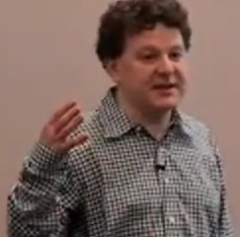Dr. Jonathan Warrell
Jonathan Warrell, Ph.D. is Associate Research Scientist with Mark Gerstein’s lab in Computational Biology and Bioinformatics at Yale. His main research focuses are in Computational Neuroscience, Genomics, Machine Learning, and Evolutionary Theory. He is also interested in Computer Vision and Music Theory and Analysis which was the area of his Ph.D. as well.
Jonathan earned his Ph.D. in Music Theory and Analysis from King’s College London supervised by Christopher Wintle after completing the Music Tripos at St. John’s College in Cambridge. The title of his thesis was Repetition in the Music of Arnold Schoenberg. He pursued his postdoctoral research in machine learning and computer vision with the UCL vision and imaging group and Oxford/Oxford-Brookes vision group, and genomics with the Mhlanga lab at the University of Cape Town.
Jonathan was invited as Keynote Speaker at the AGI-21 Conference, held in the San Francisco Bay Area and virtually between the 15th and 18th of October 2021. The title of his keynote was Probabilistic Dependent Types and Semantics in AGI: Formal and Philosophical perspectives.
Jonathan worked on PsychENCODE, where they developed an integrative deep-learning approach for tracing risk for psychiatric disorders across multiple levels of organization. Further, his forthcoming work on cancer genomics develops an approach which extends the standard individual driver-based model of cancer progression to include the effects of weak drivers acting in tandem.
Read Quantum Computing at the Frontiers of Biological Sciences, Passenger mutations in more than 2500 cancer genomes: Overall molecular functional impact and consequences, and Comprehensive functional genomic resource and integrative model for the human brain.
Jonathan has been working on interpreting Deep-Learning and Machine Learning models. In order to integrate the knowledge learnt by such models with prior scientific and cultural knowledge, techniques are required to analyze or interpret the models learnt. Jonathan developed techniques for extracting and representing knowledge in deep neural nets and analyzing the sense in which deep learning models carry implicit semantics.
Read Interpretability and Implicit Model Semantics in Biomedicine and Deep Learning, Compression based network interpretability schemes, and Rank Projection Trees for Multilevel Neural Network Interpretation.
With Jonathan’s interest in Statistical Learning Theory and Probabilistic Programming, he is using these techniques to derive novel generalization bounds in the context of PAC-Bayes analysis — motivating new algorithms for problems such as transfer and meta-learning.
Read Higher-Order Generalization Bounds: Learning Deep Probabilistic Programs via PAC-Bayes Objectives, Hierarchical PAC-Bayes Bounds via Deep Probabilistic Programming, and A probabilistic dependent type system based on non-deterministic beta reduction.
Jonathan’s work on Evolution and Theoretical Biology is defining evolutionary processes embedding cyclic and multilevel notions of causality, and the relationship of global and local features in certain observed cellular molecular networks.
Read Genetic determination of regional connectivity in modelling the spread of COVID-19 outbreak for improved mitigation strategies and Cyclic and Multilevel Causality in Evolutionary Processes.
Visit his Home page, Google Scholar profile, and ResearchGate profile. Follow him on DBLP and PubMed.
